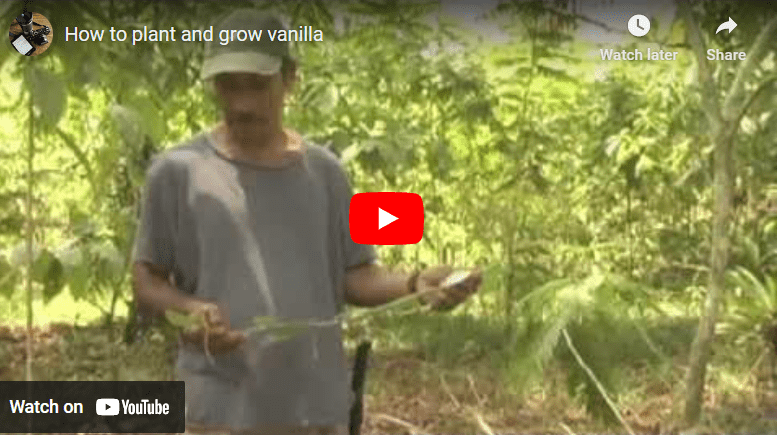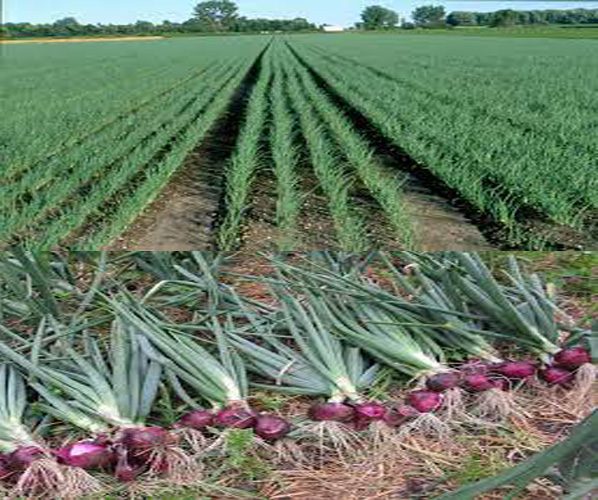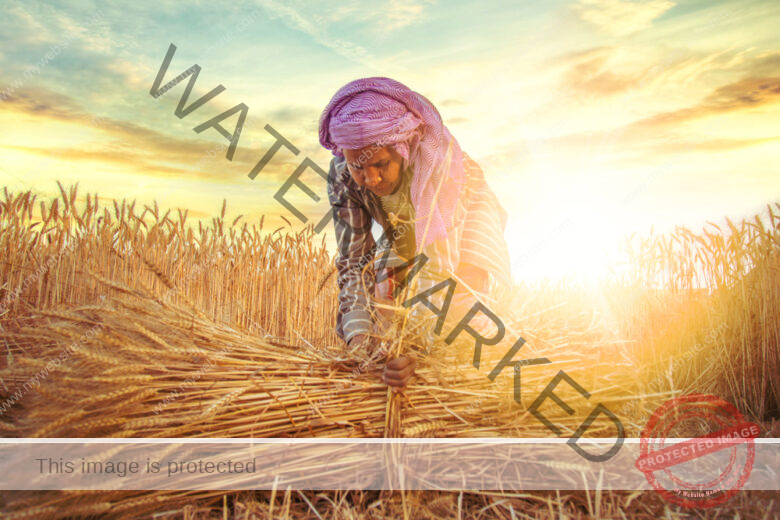Vanilla is a high-value crop that can be grown in Nigeria, offering a lucrative business opportunity for farmers.
With the global demand for vanilla beans on the rise, Nigerian farmers can tap into this market and generate significant income.
However, growing vanilla requires specific environmental conditions and proper management practices.
In this guide, we will explore how to grow vanilla in Nigeria, including the benefits and challenges of vanilla farming, factors that affect its growth, and tips for maximizing yields and quality.
How to Grow Vanilla in Nigeria
Vanilla is a tropical orchid plant that produces the vanilla bean. There are three main types of vanilla plants, namely Vanilla planifolia, Vanilla pompona, and Vanilla tahitensis.
Vanilla planifolia, also known as Bourbon vanilla, is the most widely grown and commonly used type of vanilla. Nigeria is a place where high-quality vanilla beans that are highly sought after in both local and international markets.
Read Also: [Beginners Guide] How To Plant Pear In Nigeria
Step 1: Soil and Climate Requirement
Before planting vanilla in Nigeria, it is crucial to ensure that the soil and climate conditions are suitable. Vanilla thrives in a warm and humid climate, with temperatures ranging from 21°C to 32°C and a minimum of 80% humidity.
The soil should be well-drained, rich in organic matter, and have a pH range of 5.5 to 7.0. To prepare the soil for planting, follow these steps:
Conduct a soil test to determine the pH level and nutrient content of the soil.
Add organic matter such as compost, manure, or leaf litter to improve soil fertility and texture.
Read Also: [Beginners Guide] How To Grow Spinach In Nigeria
Ensure proper drainage to avoid waterlogging by using raised beds, trenches, or installing drainage pipes.
In Nigeria, vanilla can be grown in areas with a suitable climate, particularly in the coastal regions such as Lagos, Ogun, Ondo, and Akwa Ibom.
The ideal rainfall for vanilla is between 1500mm to 2000mm per year, and it should be well distributed throughout the year to avoid waterlogging or drought.
Step 2: Selecting the Right Site
After assessing the climate and soil conditions of your farm, the next step is to select the right site for planting vanilla in Nigeria. Choose a site with partial shade, as direct sunlight can damage the plants. The site should also be protected from strong winds and have good water availability.
Read Also: 15 Best Herbicides for Maize Farms in Nigeria
Step 3. Preparing The Land For Planting
Once you have selected the right site for planting vanilla, the next step is to prepare the land. Clear the land of all weeds, rocks, and debris. Plow the land to a depth of 30cm and level it to ensure proper drainage.
You can also add organic matter such as compost, manure, or leaf litter to improve soil fertility and texture. In addition, consider adding mulch to retain moisture and control weeds.
Step 4. Propagation Techniques
Vanilla can be propagated through cuttings or seedlings. However, cuttings are preferred as they produce high-quality beans in a shorter time. To propagate vanilla using cuttings, follow these steps:
Obtain cuttings from healthy and disease-free plants, and ensure that each cutting has at least three nodes.
Read Also: [Beginners guide] How To Grow Okra in Nigeria
Treat the cuttings with a rooting hormone to encourage root growth.
Plant the cuttings in a well-draining soil mix and keep them in a warm and humid environment.
After two to three months, the cuttings should have developed roots and can be transplanted into the field.
By following these steps, you can successfully grow vanilla in Nigeria and enjoy the benefits of this valuable crop.
Step 5. Planting Vanilla
After preparing the land and obtaining cuttings, it is time to plant vanilla in Nigeria.
Vanilla cuttings should be planted during the rainy season, between March and June, when there is sufficient moisture in the soil.
Read Also: [Beginners Guide] How To Grow Apple in Nigeria
Dig holes that are 30cm deep and 30cm wide, and space them 1.5m apart. Plant the cuttings at a depth of 15cm, ensuring that the bottom node is in contact with the soil. Backfill the holes with soil and press firmly around the cuttings.
Vanilla plants require support structures to climb on. Bamboo poles or trellises can be used to support the plants. Install the support structures immediately after planting.
Step 6. Mulching and Irrigation
Mulch the soil around the base of the plants to conserve moisture and prevent weed growth. Irrigate the plants regularly, especially during the dry season. To prevent root rot, it’s important to refrain from excessive watering.
Step 7: Vanilla Plant Care
To ensure that your vanilla plants grow healthy and produce high-quality beans in Nigeria, proper plant management is necessary. Here are the key aspects of vanilla plant management:
Read Also: Seasonal Planting Guidelines for Native Yam In Nigeria [Farmers Guide]
Step 1. Fertilization
Vanilla plants require regular fertilization to thrive in Nigeria. Apply a balanced fertilizer every three months, starting three months after planting. Use organic fertilizers such as compost, poultry manure, or cow manure, as they are rich in nutrients and help improve soil fertility.
Step 2. Pests and Diseases Control
Vanilla plants are susceptible to pests and diseases such as scale insects, thrips, mealybugs, and fungal diseases in Nigeria. Regular scouting and monitoring of the plants are necessary to detect and control these pests and diseases early. Use organic pest control methods such as neem oil, garlic spray, or soap solution.
Step 3. Pruning and Training
Prune the vanilla plants regularly to control their growth and ensure that they climb on the support structures properly in Nigeria. Train the plants to grow in the desired direction by tying them to the support structures using soft ties.
Read Also: How To Grow Grapes in Nigeria [Beginners Guide]
Step 8. Vanilla Harvesting
Vanilla beans are ready for harvesting 8 to 9 months after planting in Nigeria. Here are the steps to follow for harvesting and post-harvest handling:
Vanilla beans are ready for harvesting when they turn yellow and begin to split at the tip in Nigeria. The beans should be plump and have a strong aroma.
Harvest the vanilla beans using sharp scissors or knives in Nigeria. Cut the beans at the base, leaving a small portion of the stem attached. Avoid touching the beans with bare hands, as this can cause them to spoil.
Varieties of Vanilla in Nigeria
There are two main varieties of vanilla that are grown in Nigeria: Bourbon and Tahitian vanilla.
Bourbon vanilla, also known as Madagascar vanilla, is the most commonly grown variety in Nigeria. It has a strong, sweet, and creamy flavor with a floral aroma.
Tahitian vanilla, on the other hand, has a fruity and floral flavor with a strong vanilla aroma. It is less commonly grown in Nigeria compared to Bourbon vanilla.
Read Also: How To Grow Groundnut in Nigeria [Beginners Guide]
How much is Vanilla sold in Nigeria
The price of vanilla in Nigeria varies depending on the quality and quantity of the product. At the time of writing, a kilogram of vanilla beans can sell for between ₦120,000 to ₦150,000 (approximately $294 to $367) in the Nigerian market.
However, the price can fluctuate due to various factors such as supply and demand, weather conditions, and global market trends.
Best Agronomic Practices to engage in growing Vanilla in Nigeria
To grow vanilla in Nigeria, it is important to follow the best agronomic practices. Here are some tips to consider:
- Choose a suitable location with well-drained soil and a warm, humid climate.
- Provide support for the vanilla vines to climb, such as trellises or poles.
- Ensure proper irrigation to prevent water stress in the plants.
- Use organic fertilizers and mulch to maintain soil fertility and moisture.
- Regularly prune the vines to encourage healthy growth and fruiting.
- Control weeds and pests using environmentally friendly methods.
Projected profit of Vanilla in Nigeria
Vanilla farming in Nigeria can be profitable if done correctly. According to research, a one-acre vanilla plantation in Nigeria can yield up to 700 kg of vanilla beans per year.
With a conservative estimate of ₦120,000 ($294) per kg, the projected profit could be as high as ₦84,000,000 ($205,000) per year.
However, it is important to note that this projection depends on various factors such as market demand, production costs, and farming practices.
Common Diseases and Pests of Vanilla
Vanilla in Nigeria is susceptible to various diseases and pests. Some common ones include:
- Vanilla stem borer: This pest damages the stems of vanilla plants, causing the vines to weaken and die. The larvae of the borer can be controlled by handpicking and destroying infested parts or using insecticides.
- Fusarium wilt: This disease causes the leaves of the plant to yellow and wilt, and can eventually lead to death. The disease can be controlled by using resistant varieties, avoiding waterlogging, and practicing crop rotation.
- Anthracnose: This fungal disease causes dark, sunken lesions on the leaves and stems of the plant. It can be controlled by removing and destroying infected plant parts and applying fungicides.
Different Propagation Method of Vanilla
There are two main propagation methods of vanilla:
- Stem cuttings: This involves taking a stem cutting from a mature vanilla plant and rooting it in a suitable medium. Once rooted, the cutting can be transplanted to a new location to grow into a new plant.
- Tissue culture: This involves using a small piece of plant tissue, such as a leaf or stem, to grow new plants in a laboratory setting. The new plants can then be transplanted to a suitable location to grow into mature plants.
In Nigeria, stem cuttings are the most commonly used method of vanilla propagation.
Marketing and Business Opportunities for Nigerian Vanilla Farmers
Nigeria has a great opportunity to tap into the global demand for vanilla beans and create a lucrative business for its farmers. Here are some marketing and business opportunities for vanilla farmers in Nigeria:
#1. Local and International Markets
Similar to Ghana, Nigeria has a high demand for vanilla beans in both local and international markets. Nigerian vanilla can be sold to local buyers such as bakeries, ice cream manufacturers, and spice traders. International buyers include cosmetic companies, pharmaceutical companies, and flavoring manufacturers.
#2. Exporting Vanilla from Nigeria
Nigerian vanilla beans are of high quality, making them attractive to international buyers. Exporting vanilla from Nigeria requires compliance with international trade regulations, including obtaining the necessary permits and certifications.
Benefits of Growing Vanilla in Nigeria
- Vanilla is a high-value crop that can generate significant income for farmers in Nigeria.
- The favorable climate and soil conditions in Nigeria make it an ideal location for vanilla cultivation.
- Vanilla farming can provide employment opportunities for local communities in Nigeria.
- Vanilla beans are in high demand globally, creating a lucrative market for farmers in Nigeria.
- Vanilla farming can help to diversify the agricultural sector and contribute to Nigeria’s economic development.
Challenges of Growing Vanilla in Nigeria
- Vanilla plants require specific environmental conditions, and failure to meet these conditions can lead to low yields and poor-quality beans in Nigeria.
- Vanilla plants are susceptible to pests and diseases, which can cause significant crop losses if not properly managed in Nigeria.
- Vanilla farming requires significant upfront investment in terms of infrastructure, labor, and inputs in Nigeria.
- The lack of access to finance and technical support can be a significant challenge for small-scale farmers in Nigeria.
Factors That Affect Growing Vanilla in Nigeria
- Temperature and humidity are critical factors in vanilla farming, and they can vary depending on the location in Nigeria.
- Soil quality, including pH, nutrient levels, and drainage, affects the growth and yield of vanilla plants in Nigeria.
- The availability of irrigation water and access to inputs such as fertilizers and pesticides can impact the success of vanilla farming in Nigeria.
Is Growing Vanilla Profitable in Nigeria?
- Vanilla farming can be profitable in Nigeria, given the high demand for vanilla beans and their high market value.
- However, the profitability of vanilla farming depends on several factors, including yield, quality, input costs, and market prices in Nigeria.
- Proper management practices, including pruning, fertilization, and pest control, can help to maximize yields and improve the quality of vanilla beans in Nigeria.
Can Vanilla Grow In Nigeria
Yes, vanilla can grow in Nigeria. Although vanilla is a tropical plant that requires specific environmental conditions such as high humidity, adequate rainfall, and moderate temperatures, some regions in Nigeria meet these requirements.
With proper management practices, Nigerian farmers can successfully grow vanilla and tap into the lucrative global market for vanilla beans.
How To Grow Vanilla
Growing vanilla requires specific environmental conditions and proper management practices. Vanilla plants thrive in well-draining soil, with high organic matter content and a pH range of 5.5-7.0.
Vanilla requires partial shade, high humidity, and adequate rainfall. Proper pest management and pruning practices are also crucial to maximize yields and improve the quality of vanilla beans.
How To Grow Nigerian Virgin Hair
Nigerian virgin hair is highly sought after for its quality and versatility. To grow Nigerian virgin hair, it is important to maintain a healthy diet and lifestyle, avoid harsh chemicals and heat styling, and use gentle hair care products. Regular deep conditioning and protective styling can also help to promote hair growth and maintain its natural texture.
Vanilla Plant In Nigeria
The vanilla plant (Vanilla planifolia) is a tropical orchid that belongs to the family Orchidaceae. Vanilla plants require specific environmental conditions such as partial shade, high humidity, and adequate rainfall. Nigerian farmers can grow vanilla in regions that meet these requirements and tap into the lucrative global market for vanilla beans.
Conclusion
Growing vanilla in Nigeria can be a profitable venture for farmers, with its high market value and global demand. While vanilla farming comes with challenges such as specific environmental conditions and pest management, proper management practices can help to maximize yields and improve the quality of vanilla beans.




